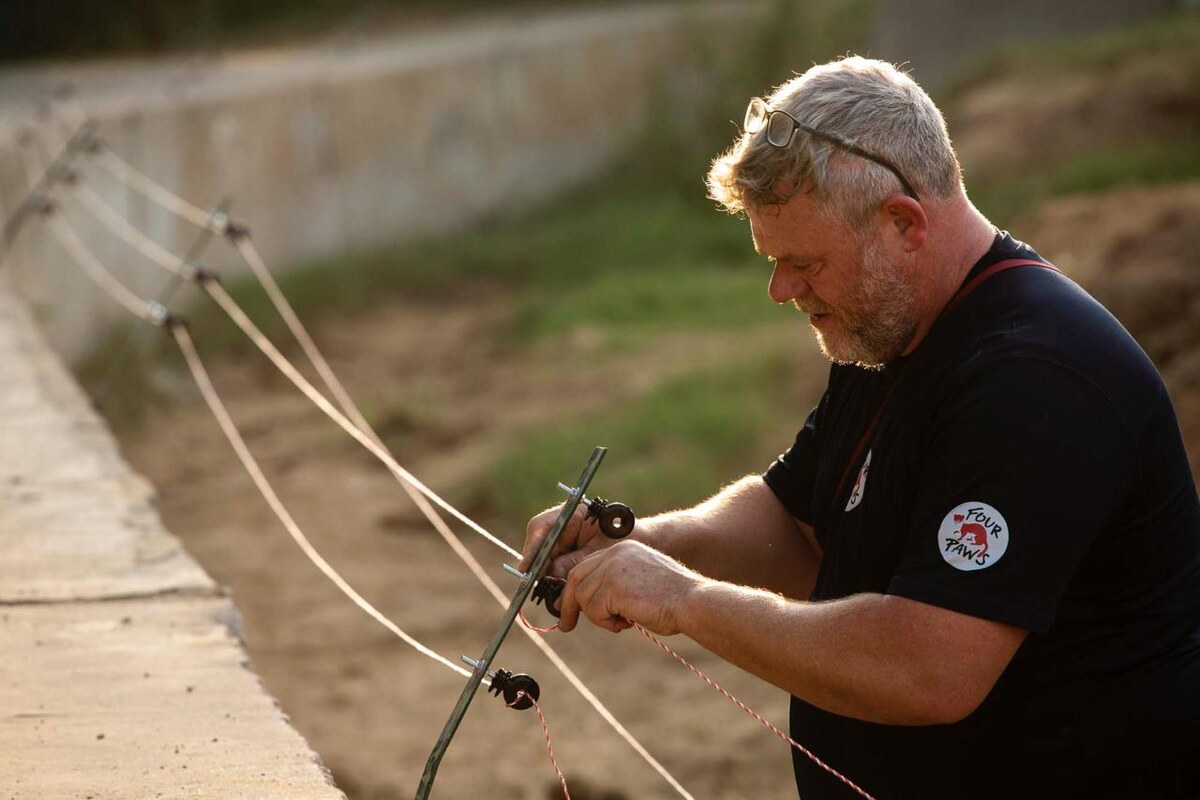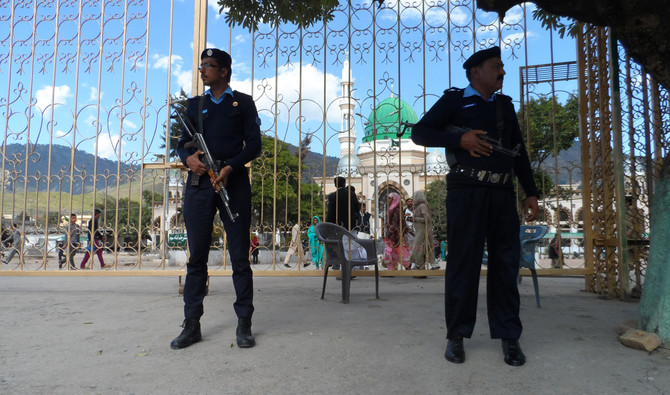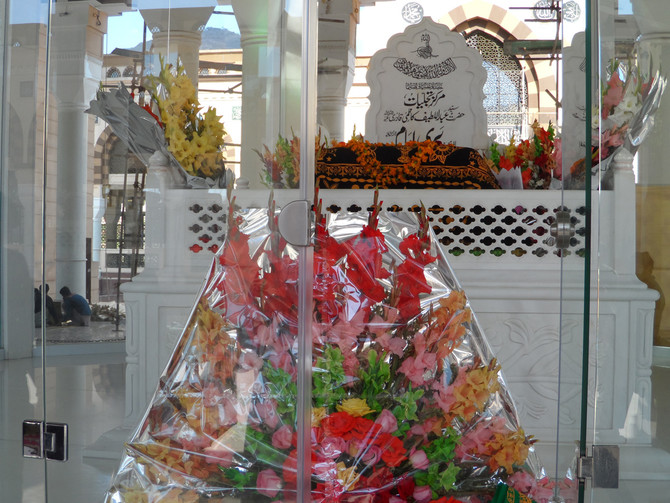ISLAMABAD: Custodians of shrines, commonly known as pirs (spiritual leaders), are considered as vital part of Pakistani politics.
They enjoy a vast support of their followers both in rural and urban areas of the country that makes them power players in electoral politics.
The shrines of spiritual leaders are spread across Pakistan, especially in Punjab and Sindh provinces, besides the country’s federal capital – Islamabad.
The custodians of these shrines either contest elections from platforms of different political parties or announce their support for a particular candidate or a political party.
Their influence over the thousands of devotees make them a power players in electoral politics as devotees look to the pirs for guidance during the elections. Leaders of the key political parties visit them to seek their support.
“Basically, we are a conservative society and people still consider the pirs as their spiritual guide and take pride in becoming their devotees,” Professor Tahir Malik, political analyst and academic, told Arab News.
He said that in Punjab and Sindh provinces some pirs not only contest the elections, but are elected to the Parliament with ease as well. “They are electable candidates in their respective constituencies and change their political loyalties to remain in power and keep hold on their devotees-cum-constituents,” he said.
He added that shrine guardians participated in 1937 and 1946 elections of the subcontinent (partitioned into the two separate countries of India and Pakistan in 1947), emerging as a formidable force on the basis of their strong religious following.
“The pirs and their politics will keep thriving in Pakistan while superstitions and illiteracy persist,” he said, adding that control over the devotees is, however, waning with the increasing sway of the Internet and social media.
According to a research by Dr. Adeel Malik, a professor of development economics at the University of Oxford, there are around 64 shrines in Punjab province with direct political connections.
Multan district in Pakistan’s Punjab province has the highest number of shrine families in politics followed by Jhang, Rahim Yar Khan, Okara, Taunsa Sharif and Chishtian.
This research found that around 16 percent of the 342 members of the National Assembly that completed its five-year term in May belonged to shrine families.
For the 2018 elections, many shrine families are contesting the election from South Punjab while others support candidates and political parties of their choice.
Punjab remains the major battlefield for political parties for its number of seats in the National Assembly.
The province has 141 seats in the Lower House of the Parliament out of the 272 in which candidates contest direct elections.
It is said that the party to win Punjab can easily form a government in the center. This increases importance of the pirs and landlords in the province who emerge as the electable candidates for every political party.
The pirs, besides being guardians of the shrines, own vast extracts of agricultural land in their respective areas and collect donations from followers. This makes them virtually invincible in their constituencies.
Fayyaz Raja, a political analyst at a private television channel, said that the pirs and their followers traditionally supported two major political parties – Pakistan Muslim League-Nawaz and Pakistan Peoples Party – in the polls.
“This time the majority of them have switched to Pakistan Tehreek-e-Insaf due to the Khatam-e-Nabuwat issue,” he told Arab News.
An amendment in Khatam-e-Nabuwat (finality of Prophethood) clause, now withdrawn, prompted a row in November last year and will cost the outgoing ruling party, PML-N, in this election, Raja believes.
Custodians of some shrines are contesting elections as independent candidates, he said, adding they would become part of a political wheeling and dealing after the elections to form the government and get ministries of their choice.
Raja said that in the past couple of months, PTI chairman Imran Khan has been exploiting the issue of Khatam-e-Nabuwat and has succeeded in getting support of different shrines.
“It is quite normal for these pirs to switch political loyalties ahead of the elections,” he said, “this time they have used Khatam-e-Nabuwat as the pretext and switched to PTI to become part of the power game.”
Shrines; the other invisible power in Pakistani politics
Shrines; the other invisible power in Pakistani politics

- According to research, around 64 shrines in Punjab alone have political connections
- Political analysts say pirs change their political loyalties before elections to retain political influence and a keep a hold on followers
World Economic Forum says Pakistan now world’s sixth-largest solar market

- Pakistan’s “rapid adoption” of solar energy provides valuable lessons for emerging markets, says WEF
- Says declining solar panel prices, skyrocketing electricity tariffs reasons for Pakistan pursuing solar energy
ISLAMABAD: Pakistan is now the sixth-largest solar market in the world and its “rapid adoption” of solar energy provides valuable lessons for emerging markets, a World Economic Forum report said this week as Islamabad tries to dodge rising fuel prices through renewable energy resources.
Pakistan’s energy sector has long struggled with financial strain due to circular debt, power theft and transmission losses, leading to blackouts and high electricity costs.
Experts say Pakistan has ideal climatic conditions for solar power generation, with over nine hours of sunlight in most parts of the country. According to the World Bank, utilizing just 0.071 percent of the country’s area for solar photovoltaic (solar PV) power generation would meet Pakistan’s electricity demand.
According to the National Electric Power Regulatory Authority, currently, only 5.4 percent of Pakistan’s installed power generation capacity of 39,772 megawatts comes from renewables like wind, solar and biomass, while fossil fuels still make up 63 percent of the fuel mix, followed by hydropower at 25 percent.
“The country is now the world’s sixth-largest solar market,” WEF said in its report published on Monday. “Declining solar panel prices, coupled with skyrocketing grid electricity tariffs that have increased by 155 percent over three years, are fueling a rush in renewable energy adoption in Pakistan, with solar power leading the way.”
The report highlighted that Pakistan’s move to adopt solar energy was driven by external factors such as China’s overproduction of solar panels, which had lowered the costs for Pakistan, making the country the third-largest destination for Chinese solar exports.
“Industrial, agricultural and residential sectors have embraced solar, with imported Chinese modules totaling 13 gigawatts (GW) in the first half of the year, and forecasts reaching 22GW by year-end,” the report said.
The WEF said the inability of state-owned energy providers to provide a stable supply and the government’s inconsistent energy policy characterized by ” inefficiencies in production, pricing and regulations” has deepened Pakistan’s energy crisis, aiding in the usage of solar energy.
“Grid electricity demand dropped by more than 10 percent in the past fiscal year as inflated tariffs burden consumers with covering inefficiencies,” the report added. “This trend has sparked a wave of solar adoption among industrial, commercial and private users who can afford self-generation.”
Supportive policies like offering credit for solar in off-grid areas and unbundling customer categories can also boost renewable energy adoption, it said.
“Pakistan’s journey underscores the importance of balancing policy innovation with market adaptation to drive sustainable and equitable energy solutions,” the WEF report concluded.
Pakistan reaffirms unwavering support for Palestine, demands unconditional ceasefire in Gaza

- Shehbaz Sharif’s message comes as world marks International Day of Solidarity with Palestinian People
- Calls on international community to act “swiftly and decisively” to put a halt to Israel’s “atrocities” in Gaza
ISLAMABAD: Prime Minister Shehbaz Sharif expressed Pakistan’s unwavering support for the people of Palestine on Tuesday and demanded an unconditional ceasefire in Gaza, as the world marks the International Day of Solidarity with Palestinian People today.
The International Day of Solidarity with Palestinian People is marked every year on Nov. 29 to express support for the people of Palestine facing occupation at the hands of Israel. This year, the day is being observed on Nov. 26.
Pakistan’s message of support for Palestine comes amid heightened tensions in the Middle East. Israel has killed over 44,000 people since Oct. 7, 2023 after Hamas launched a surprise attack on the Jewish state the same day. Israel has also launched military operations against Lebanon and exchanged missile attacks with Iran over the past few months.
“International Day of Solidarity with the Palestinian People is being observed on Tuesday to express solidarity and support with the oppressed people of Palestine,” state broadcaster Radio Pakistan said.
“In his message on the occasion, Prime Minister Shehbaz Sharif reaffirmed the unwavering support of the people and Government of Pakistan for the just cause of Palestine and the inalienable right of the Palestinian people to self-determination.”
Sharif said Pakistan calls on the international community to “act swiftly and decisively, to impose an immediate halt to Israel’s atrocities.”
He condemned Israel’s attacks on Palestinian civilians, hospitals, schools and critical infrastructure in Gaza.
“He said Pakistan further calls for an immediate and unconditional ceasefire in Gaza and stresses the urgency of ensuring unhindered humanitarian assistance to the Palestinian people,” the state broadcaster said.
Pakistan does not recognize nor have diplomatic relations with Israel and calls for an independent Palestinian state based on “internationally agreed parameters” and the pre-1967 borders with Al-Quds Al-Sharif as its capital.
Since the beginning of the war in October last year, Pakistan has repeatedly called for a ceasefire in Gaza and raised the issue at the United Nations, the Organization of Islamic Cooperation (OIC) and other international forums, urging an end to Israeli military actions.
Four Rangers, two cops killed in clashes as Imran Khan supporters enter Islamabad — state media

- Army deployed in Pakistan’s capital with instructions to shoot miscreants on site, says state media
- Interior minister warns Imran Khan’s party against crossing any “red line” as they reach capital
ISLAMABAD: Four Rangers personnel and two policemen have been killed in clashes with Imran Khan’s supporters in Islamabad, state-run media reported on Tuesday, as thousands of protesters entered Pakistan’s capital demanding the jailed former prime minister’s release from prison.
Thousands of rallygoers, who had reached the edges of Islamabad on Monday night in protest caravans that set out from various parts of the country last week, entered Islamabad where they reportedly clashed with law enforcers on the city’s Srinagar Highway.
Supporters of Khan’s Pakistan Tehreek-e-Insaf (PTI) party set out despite the government refusing to grant the PTI permission to enter Islamabad for a sit-in. Last week, the district administration also imposed a two-month ban on public gatherings in the capital, citing security challenges and inconvenience to the public.

Khan’s PTI is protesting for the release of political prisoners, including Khan, among other demands. State broadcaster Radio Pakistan said the government had invoked Article 245 of the constitution to deploy the army in the capital “to deal with the miscreants with an iron hand.”
“According to security sources, miscreants rammed a vehicle into Rangers personnel resulting in the martyrdom of four Rangers officials during PTI’s protest on Srinagar Highway in Islamabad,” Radio Pakistan said.

“Five other Rangers personnel and several police officials sustained severe injuries.”
The report said that Khan supporters pelted stones on Rangers personnel and carried out indiscriminate firing on security personnel at the Chungi no. 26 area in Islamabad’s tiwn city of Rawalpindi.
It said two police officers were also killed in clashes.
“Under Article 245, the Pakistan Army has been called in, and orders have been issued to deal with the miscreants with an iron hand,” Radio Pakistan said.
“Clear orders have also been issued to shoot miscreants and troublemakers on sight.”

Meanwhile, the PTI alleged on social media platform X that law enforcers had opened fire on its unarmed supporters in the capital. It said that the party’s protest caravan in the city’s G-11 area was being heavily teargassed.
“The fake government is ready to go to any extent to maintain its illegal occupation,” the PTI said.
Islamabad has remained under a security lockdown since Sunday, with authorities closing all schools in the capital and the adjacent garrison city of Rawalpindi, while Internet and WhatsApp messaging services have also slowed.
All routes connecting Islamabad and Rawalpindi have been completely shut since Sunday, as are highways and roads from other cities leading to the federal capital.
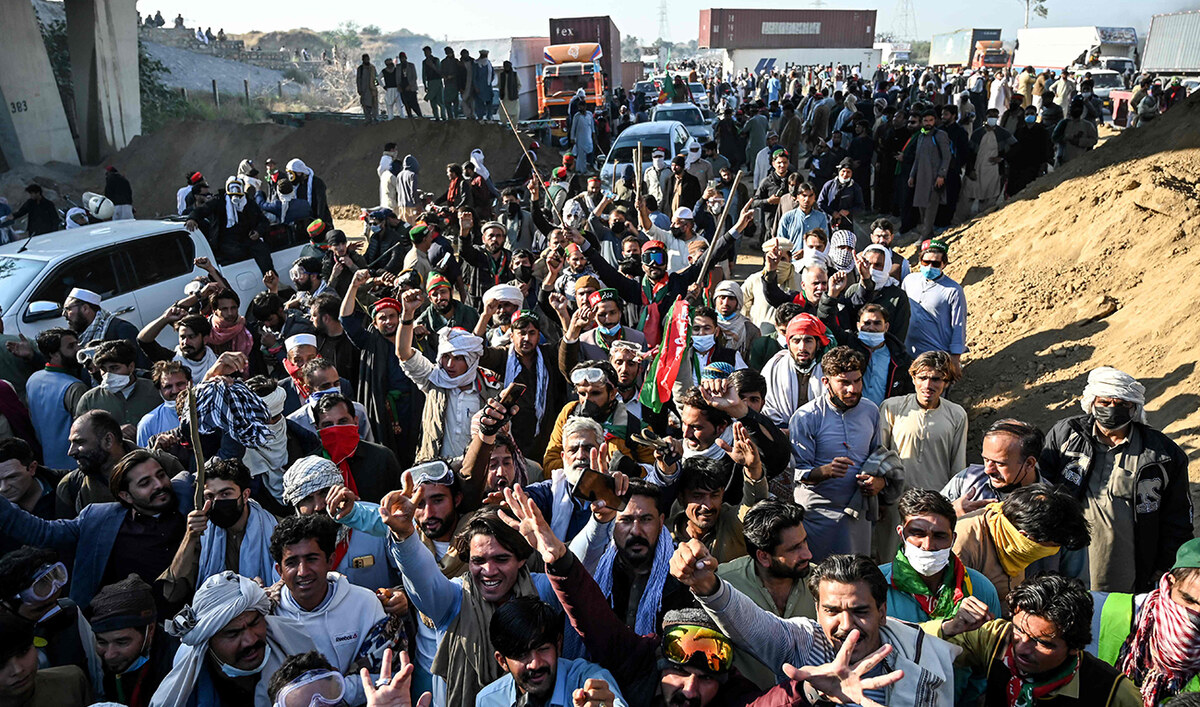
Inspector General (IG) Punjab, Dr. Usman Anwar, said on Monday that 119 cops had been injured, some of them due to gunfire by miscreants.
Speaking to reporters late Monday night, Interior Minister Mohsin Naqvi said the government had offered the PTI a designated place at Sangjiani area in Islamabad to protest.
“A head of state is in Islamabad, it is a sensitive [time], we do not want to go to an extreme step at D-Chowk,” Naqvi said, referring to the Belarusian president, who is in Islamabad with a high-level delegation.
“But do not cross the red line which forces us to go to that extreme step.”
US CALLS FOR PEACEFUL DEMONSTRATIONS
US State Department Spokesperson Matthew Miller reacted to ongoing protests in Islamabad, saying that Washington supports freedom of expression and the right to peaceful assembly in every country.
“We call on protesters to demonstrate peacefully and refrain from violence, and at the same time, we call on Pakistani authorities to respect human rights and fundamental freedoms, and to ensure respect for Pakistan’s laws and constitution, as they work to maintain law and order,” the Miller said.
He declined to comment when a reporter asked him whether it looked like Pakistan’s future was heading in the same direction as that of Bangladesh, where protests this year toppled Sheikh Hasina’s government and forced her into exile.
‘TILL MY LAST BREATH’
The PTI march started on Sunday but could not reach Islamabad the same day as shipping containers placed by the government on key points on major highways slowed the pace of the caravans. The PTI says its final destination is D-Chowk, a high-security area in the capital’s Red Zone that houses key government buildings and is a popular site for protests.
The largest PTI protest caravan began its journey from Peshawar, the provincial capital of the Khyber Pakhtunkhwa (KP) province where Khan’s party is in power. It is being led by KP Chief Minister Ali Amin Gandapur and Khan’s wife Bushra Khan, who was released on bail in October after nearly nine months in detention.
Khan has been in jail since August last year and faces a slew of charges he says are politically motivated.
“Until Khan does not return to us, we will not end this march,” Bushra said to supporters from atop the protest caravan on Monday afternoon.
“I will stand there till my last breath, you people have to stand by me. I will keep standing even if nobody does because this does not concern just my husband but the country and its leader.”
Islamabad police has confirmed over 400 arrests related to the protest in the past few days, saying the detainees were being held in different police stations. The PTI said over 3,500 of its leaders and supporters had been arrested in connection to the protests.

The PTI’s march has coincided with a visit to Islamabad by Belarusian President Aleksandr Lukashenko and a 68-member delegation to discuss investment deals. The government has accused the PTI of trying to sabotage the foreign visit in a bid to destabilize its economic recovery efforts.
The PTI rejected this criticism, saying its protest had been called before the announcement of the Belarusian delegation’s visit.
‘Give us another solution,’ Balochistan CM asks opponents of military operation against separatists

- Government has announced operation but not shared details of scale, scope, whether it will be joint effort with China
- Analysts say military solutions will not work in Balochistan, plagued by low-level separatist insurgency since decades
QUETTA: Sarfraz Bugti, the chief minister of Balochistan, on Monday asked opponents of a planned military operation against separatists in the insurgency-plagued southwestern province to suggest another solution to a surge in militant attacks, saying the armed campaign would target “terrorists and their camps.”
The province has seen a rise in deadly attacks that have targeted both citizens and security forces in recent months, including a series of coordinated assaults in August in which over 50 people were killed and a suicide bombing last month that targeted Pakistani army troops at a railway station, killing 27, including 19 soldiers, who were in civilian clothing.
Last Tuesday, the federal government announced that it would launch a “comprehensive” military operation to stem the rising tide of separatist militancy, though many political parties, civil rights groups and citizens have questioned the chances of the armed campaign’s success in the vast province.
“Obviously, this will be a targeted operation and the operation will be against those who are committing this terrorism, there will be operations against the terrorist camps,” Bugti said in response to questions by reporters.
“My question to all political parties is that if any other solution is seen emerging against this terrorism, then the government and the state of Pakistan are ready for this solution. These nationalist parties should tell us that solution … If any other political party knows any other solution, I ask them to tell the government.”
The statement from the prime minister’s office last week announcing the launch of the operation did not give any details, including which security forces would take part, whether the campaign would be limited to ground operations or could involve the air force, when it would be launched and in which parts of the vast, remote Balochistan province. It also did not mention if the plan would be a joint effort with Beijing, since Balochistan is home to key Chinese Belt and Road projects, and there has been a rise in attacks on Chinese nationals and interests in the region.
Pakistan’s military already has a huge presence in Balochistan, which borders Afghanistan and Iran and is home to a decades-long separatist insurgency by militants fighting for a separate homeland to win a larger share of benefits from the resource-rich province. The government and military deny they are exploiting the province’s mineral wealth or ignoring its economic development.
The military has long run intelligence-based operations against insurgent groups, the most prominent being the Baloch Liberation Army (BLA), which has escalated attacks in recent months on the military and nationals from longtime ally China.
The region hosts the Gwadar Port, built by China as part of the China-Pakistan Economic Corridor (CPEC), a $65 billion investment in President Xi Jinping’s Belt and Road infrastructure initiative to expand China’s global reach.
In addition to the recent attacks, the BLA also claimed a suicide bombing last month outside the international airport in the southern port city of Karachi that killed two Chinese engineers.
Ethnic Baloch separatists have launched several insurgencies in Balochistan since the birth of Pakistan in 1947, including from 1948-50, 1958–60, 1962–63 and 1973–1977. An ongoing low-level insurgency began in 2003. The army has launched several military campaigns in response, including as early as 1948 in the state of Kalat and a five-year-long operation in the 70s under Prime Minister Zulfiqar Ali Bhutto.
“Many political governments have come and gone in Balochistan but the operation has continued,” Sardar Akhter Jan Mengal, head of the Balochistan National Party (BNP) and a prominent Baloch nationalist leader in the province, told Arab News last week. “No one can resolve Balochistan’s political issue with military operations.”
Indeed, political leaders and independent analysts have for years urged the government to take a holistic approach to resolving Balochistan’s problems, which they say stems from decades of economic deprivation and political disenfranchisement. The province, which comprises 44 percent of Pakistan’s total land mass, is its most backward by almost all economic and social indicators.
Rich in land and mineral wealth, most parts of the region often lack even the rudiments of modern life. For instance, though home to Reko Diq, one of the world’s largest undeveloped copper and gold deposits, and the site of major Chinese investment projects, the province lacks employment opportunities and basic facilities like Internet, health and education.
Balochistan is also the least represented in Pakistan’s parliament, where legislative seats are allocated to provinces according to their population. Balochistan has a population of only 14.89 million people in a country of over 240 million and is hence allocated only 16 National Assembly seats. Punjab, with a much smaller land area but a population of 127.68 million, gets 141 seats.
Elephant Madhubala to reunite with cousins today after 15-year separation

- Madhubala, one of only three captive elephants in Pakistan, was brought from Tanzania in 2009 along with three other elephants
- She and her companion, Noor Jehan, were then brought to Karachi Zoo, Noor Jehan died last year, leaving Madhubala alone
KARACHI: Elephant Madhubala is set to be reunited with her cousins at Karachi’s Safari Park sanctuary today, Tuesday, after being separated from them for 15 years and spending the last year alone, an animal welfare organization said.
Named after a legendary Indian actress, Madhubala, one of only three captive elephants in Pakistan, was brought to the country in 2009 along with three other elephants from Tanzania. She and her companion Noor Jehan were separated from their kin about a decade and a half ago and moved to the Karachi Zoo.
Noor Jehan passed away in April 2023 at the age of 17 after being critically ill due to neglect, leaving Madhubala alone at the zoo since then. Animal rights organizations have since campaigned for Madhubala to be shifted to the Safari Park, saying the solitary life was taking a toll on her health.

A team from FOUR PAWS International, a Vienna-based animal welfare organization, has arrived in Karachi to oversee Madhubala’s transfer to the sanctuary on Tuesday.
“I’m excited to see how Madhubala will react when she meets her cousins,” Dr. Amir Khalil, director of reveal and rescue at FOUR PAWS, told Arab News.
“Imagine someone who hasn’t seen their siblings in fifteen years — how will she feel when they finally reunite?”
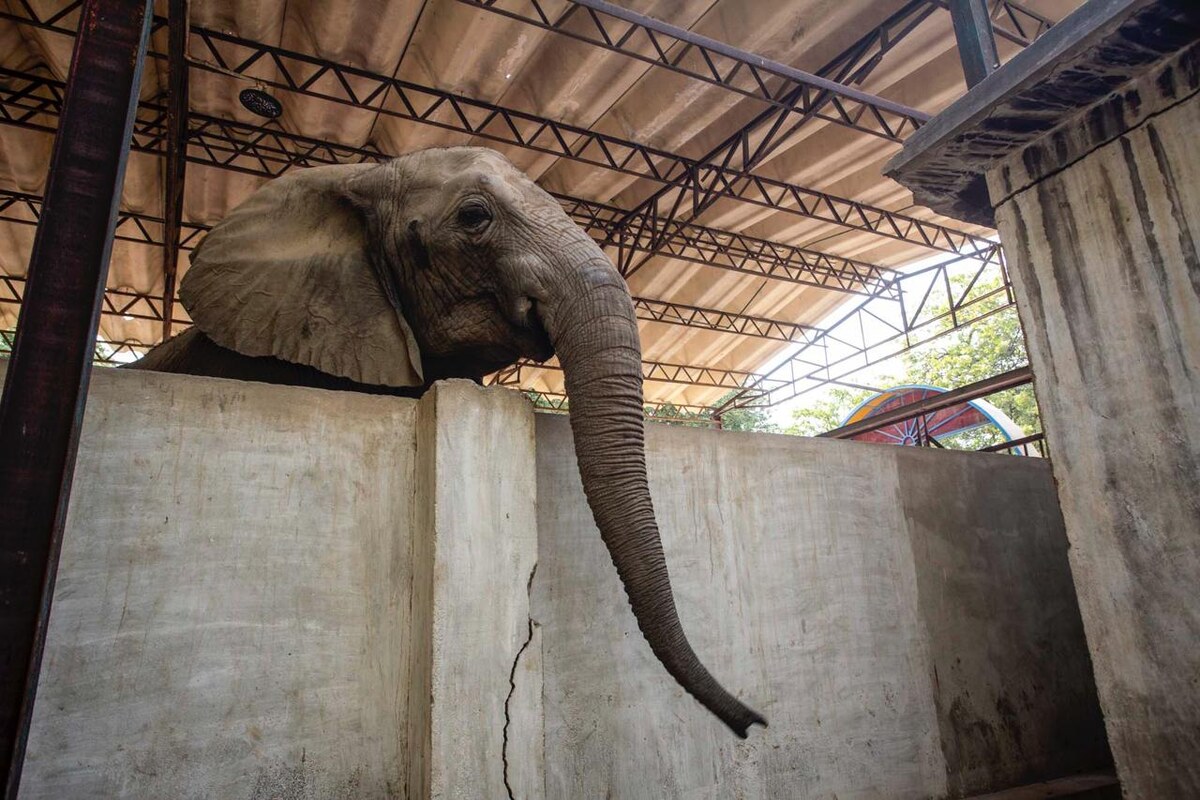
FOUR PAWS said in a statement last month that the adaptation work at Karachi’s Safari Park had reached its final stage.
Madhubala will be carried from the Karachi Zoo to the Safari Park in a huge transport crate. The elephant has been trained to enter and exit the crate by herself and sit inside it during the move.
“As part of the final preparations, the focus now lies on completing the landscaping of the elephant enclosure at Safari Park, finalizing enrichment features, and continuing the necessary training of the three elephants, including resuming crate training for Madhubala,” FOUR PAWS said.
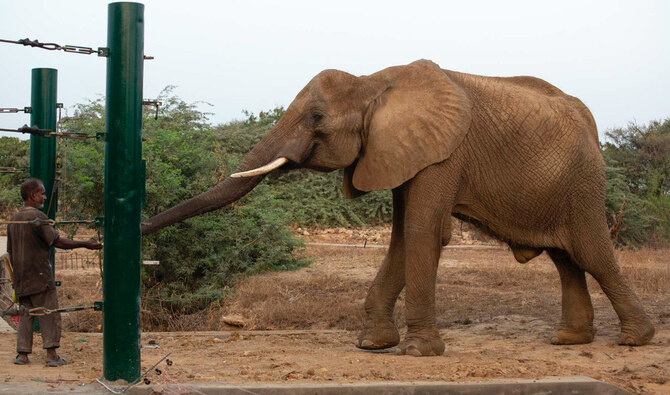
The elephant enclosures at Safari Park will have water elements for bathing, skincare and thermoregulation. Enrichments such as hay nets, varying substrates like soil, sand, clay, and sawdust will be provided for Madhubala to dust bathe. The area has also been secured by elephant-proof fencing.
Animal rights activists have long campaigned about the plight of animals in Pakistan, especially elephants, and demanded they be shifted to “species-appropriate” locations such as the Safari Park.
